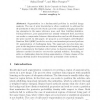Free Online Productivity Tools
i2Speak
i2Symbol
i2OCR
iTex2Img
iWeb2Print
iWeb2Shot
i2Type
iPdf2Split
iPdf2Merge
i2Bopomofo
i2Arabic
i2Style
i2Image
i2PDF
iLatex2Rtf
Sci2ools
149
click to vote
MICCAI
2010
Springer
2010
Springer
3D Knowledge-Based Segmentation Using Pose-Invariant Higher-Order Graphs
Segmentation is a fundamental problem in medical image analysis. The use of prior knowledge is often considered to address the ill-posedness of the process. Such a process consists in bringing all training examples in the same reference pose, and then building statistics. During inference, pose parameters are usually estimated first, and then one seeks a compromise between data-attraction and model-fitness with the prior model. In this paper, we propose a novel higher-order Markov Random Field (MRF) model to encode pose-invariant priors and perform 3D segmentation of challenging data. The approach encodes data support in the singleton terms that are obtained using machine learning, and prior constraints in the higher-order terms. A dual-decomposition-based inference method is used to recover the optimal solution. Promising results on challenging data involving segmentation of tissue classes of the human skeletal muscle demonstrate the potentials of the method.
Dual-decomposition-based Inference Method | Human Skeletal Muscle | Medical Image Analysis | Medical Imaging | MICCAI 2010 |
| Added | 29 Jan 2011 |
| Updated | 29 Jan 2011 |
| Type | Journal |
| Year | 2010 |
| Where | MICCAI |
| Authors | Chaohui Wang, Olivier Teboul, Fabrice Michel, Salma Essafi, Nikos Paragios |
Comments (0)

